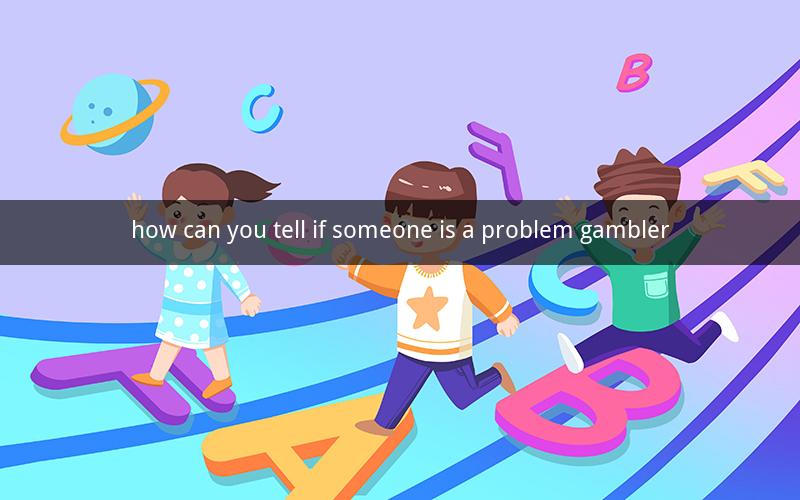
Directory
1. Introduction to Problem Gambling
2. Identifying Signs of Problem Gambling
2.1. Behavioral Indicators
2.2. Financial Signs
2.3. Emotional and Psychological Symptoms
3. The Impact of Problem Gambling on Individuals and Relationships
4. Professional Help and Support for Problem Gamblers
5. Conclusion
1. Introduction to Problem Gambling
Problem gambling, also known as gambling disorder, is a serious condition characterized by an uncontrollable urge to gamble. It can lead to significant harm in various aspects of a person's life, including financial, emotional, and social well-being. Recognizing the signs of problem gambling is crucial for early intervention and support.
2. Identifying Signs of Problem Gambling
2.1. Behavioral Indicators
1. Increased Time Spent Gambling: Problem gamblers often find themselves spending more and more time on gambling activities, neglecting their responsibilities and interests.
2. Trying to Win Back Lost Money: Problem gamblers may repeatedly attempt to win back money they have lost, leading to further financial strain.
3. Lying About Gambling Activities: Hiding gambling habits from loved ones is a common behavior among problem gamblers.
4. Gambling to Relieve Anxiety or Stress: Some individuals turn to gambling as a coping mechanism for emotional distress.
2.2. Financial Signs
1. Ignoring Financial Obligations: Problem gamblers may prioritize gambling over paying bills, rent, or other essential expenses.
2. Debt Accumulation: The desire to keep gambling often leads to accumulating substantial debt, which can be difficult to repay.
3. Financial Secrecy: Problem gamblers may keep their gambling activities hidden from others to avoid judgment or consequences.
2.3. Emotional and Psychological Symptoms
1. Feelings of Guilt or Shame: Problem gamblers often experience guilt or shame due to their gambling behavior.
2. Depression and Anxiety: Gambling can exacerbate feelings of depression and anxiety, leading to a downward spiral in mental health.
3. Compulsive Behavior: Problem gamblers may exhibit compulsive behavior, where they feel driven to gamble despite negative consequences.
3. The Impact of Problem Gambling on Individuals and Relationships
Problem gambling can have devastating effects on individuals and their relationships. The following are some of the key impacts:
1. Financial Ruin: Problem gamblers may face financial ruin, leading to homelessness, bankruptcy, and loss of employment.
2. Marital and Family Issues: The stress of gambling can strain marriages and families, leading to divorce, separation, and estrangement.
3. Legal Troubles: Problem gamblers may engage in illegal activities to support their gambling habits, such as theft or fraud.
4. Mental Health Issues: Problem gambling can exacerbate or trigger mental health disorders, such as depression, anxiety, and substance abuse.
4. Professional Help and Support for Problem Gamblers
Seeking professional help is essential for individuals struggling with problem gambling. The following resources are available:
1. Therapy: Cognitive-behavioral therapy (CBT) and other forms of therapy can help individuals develop healthier gambling behaviors and cope with the underlying issues.
2. Support Groups: Gamblers Anonymous and other support groups provide a safe and supportive environment for individuals to share their experiences and receive guidance.
3. Hotlines and Online Resources: Confidential hotlines and online resources offer immediate support and information for problem gamblers and their loved ones.
5. Conclusion
Identifying someone as a problem gambler requires recognizing the signs of gambling disorder. Early intervention and support can significantly improve the individual's chances of overcoming this condition. By understanding the impact of problem gambling and seeking professional help, individuals can take the necessary steps to regain control of their lives and relationships.
Related Questions and Answers
1. Q: How can I tell if someone's gambling is a problem?
A: Look for signs of increased time spent gambling, financial difficulties, and emotional or psychological symptoms such as depression or anxiety.
2. Q: Can problem gambling be cured?
A: Yes, problem gambling can be treated and cured with the right combination of therapy, support, and lifestyle changes.
3. Q: Is there a genetic component to problem gambling?
A: Yes, research suggests that genetics may play a role in the susceptibility to problem gambling.
4. Q: Can problem gambling lead to addiction?
A: Yes, problem gambling can lead to gambling addiction, which is characterized by an overwhelming urge to gamble despite negative consequences.
5. Q: How can I support a loved one who is struggling with problem gambling?
A: Encourage your loved one to seek professional help, be supportive and non-judgmental, and offer to help with practical matters such as financial management.
6. Q: Are there any medications that can help treat problem gambling?
A: While there are no specific medications for treating problem gambling, certain medications may help alleviate symptoms of co-occurring mental health disorders.
7. Q: Can problem gambling be prevented?
A: Yes, individuals can reduce their risk of developing problem gambling by avoiding risky gambling behaviors, setting limits, and seeking support when needed.
8. Q: How common is problem gambling?
A: Problem gambling affects a significant number of individuals worldwide, with estimates ranging from 0.5% to 2.5% of the population.
9. Q: Can problem gambling lead to suicidal thoughts or actions?
A: Yes, problem gambling can contribute to feelings of hopelessness and despair, which may lead to suicidal thoughts or actions.
10. Q: Is online gambling more addictive than traditional gambling?
A: Some research suggests that online gambling may be more addictive due to its accessibility and the potential for rapid, continuous play.